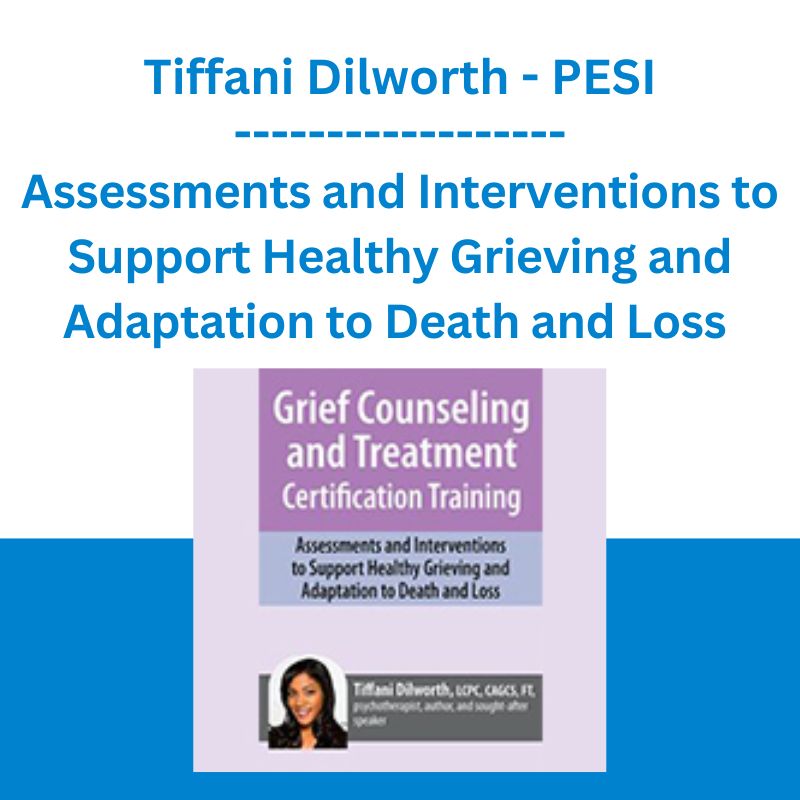*** Proof of Product ***
Exploring the Essential Features of “Grief Counseling and Treatment Certification Training: Assessments and Interventions to Support Healthy Grieving and Adaptation to Death and Loss – Tiffani Dilworth – PESI”
It has always been your calling to help the suffering.
And today a growing wave of grieving clients is looking to professionals like you for assistance as dramatic rises in death and loss have left millions in anguish.
You’re eager to lead those in pain out of their dark places and give them a glimmer of hope, but working with death and loss can be intimidating. One wrong step can break the therapeutic alliance and some forms of grief are easy to overlook, preventing you from pursuing the most beneficial treatment path.
How can you ensure you’re prepared?
This one-day certification training will give you step-by-step guidance on identifying specific manifestations of grief and individualizing counseling and treatment so you can normalize clients’ pain, listen in a way their family and friends cannot, and help them rebuild fulfilling lives!
Full of ready to use assessment tools, therapeutic approaches and specific clinical interventions, you’ll finish this training feeling ready and capable to improve grieving clients’ ability to express their emotions, build support, and process their grief in a healthy way.
Speaker
Tiffani Dilworth, LPC, CAGCS, FT
Tiffani Dilworth, LPC, CAGCS, FT, is a successful psychotherapist, author, and sought-after speaker on topics related to grief, PTSD, and sexual assault. Ms. Dilworth received her master’s in community counseling from Oklahoma State University. She’s a Licensed Clinical Professional Counselor who specializes in PTSD, grief, and sexual trauma. She’s a Fellow in Thanatology and a Certified Advanced Grief Counseling Specialist.
She has worked across the US with various organizations, schools, universities, and corporations to bring awareness to the grieving process and to teach countless people how to live alongside their grief. In addition to maintaining a private practice, Ms. Dilworth is an affiliate of PsychExperts & Associates, Inc, located in Baltimore, MD.
Drawing on her rich clinical experience, Ms. Dilworth incorporates the most current information on the process of grieving with evidence-based and innovative treatment techniques that clinicians can immediately use in their practice. She’s the author of the books 11 Tools to Help Manage the Aftermath of Trauma and Types of Grief and is the host of Managing My Grief podcast.
Speaker Disclosures:
Financial: Tiffani Dilworth has an employment relationship with Pristine Advancements, LLC. and receives royalties as a published author. She receives a speaking honorarium and recording royalties from PESI, Inc. She has no relevant financial relationships with ineligible organizations.
Non-financial: Tiffani Dilworth has no relevant non-financial relationships.
Objectives
- Analyze how types of grief and grief reactions inform clinicians’ choice of counseling or treatment.
- Investigate appropriate grief symptomology and employ assessment tools to uncover clinical concerns like trauma, depression, and suicidality.
- Utilize best practices to enhance grief counseling and treatment with clients from diverse cultures and with diverse beliefs.
- Investigate the needs of bereaved children, families, and the elderly to individualize treatment and promote healthy adaptation following loss.
- Apply CBT techniques to help clients manage guilt, blame, and other maladaptive cognitions following loss.
- Apply narrative approaches to help clients cope and empower them to construct meaning following loss.
Outline
The Many Faces of Grief: Types, Presentations and Clinical Implications
- Kübler Ross’ Stages of Grief
- Normal grief and acute reactions
- Complicated or prolonged grief
- Persistent Complex Bereavement Disorder – chronic, masked, distorted
- Ambiguous grief in the face of changes in the living
- Traumatic grief following sudden or violent loss
- Anticipatory and disenfranchised grief
- Delayed, inhibited, abbreviated other types of commonly overlooked grief
Assessment Tools for Grieving Clients: Identify Grief Intensity, Suicidality, Depression and Other Co-Occurring Disorders
- Grief intensity scale
- Hogan grief reaction checklist
- Uncover trauma, depression, and anxiety
- How to assess for suicidal thoughts or ideation
- Isolation, sleep, and nutrition concerns for grieving clients
- The caregiver grief inventory
Culture, Spirituality and Mourning: The Clinicians’ Quick Guide to Grief Work with Clients of Diverse Cultures and Beliefs
- Continuing relationships with the deceased
- How culture impacts length of mourning
- Spiritual impacts of grief
- Cultural expectations of grief to be aware of
Grief Counseling and Treatment Approaches: Promote Healthy Grieving for Clients Across the Lifespan
- Grief counseling vs. grief treatment – what’s the difference?
- Working with grief in kids, adults, and the elderly
- Dual Process Model – loss and restoration
- Companioning Model – being present for the mourner
- Task Based Model – accommodating a new life
- The ATTEND Model for increased attunement
- Complicated Grief Treatment Model
- Ethical and professional boundary issues
The Grief and Bereavement Toolbox: Enhance Emotional Regulation, Build Connection and Support Adaptation to Loss
- How to use narrative interventions in complicated grief counseling
- CBT techniques for guilt, blame and other maladaptive cognitions following loss
- Family sculpting techniques for grief
- Creative tools to support emotional regulation and expression
- Ways to build social support
- Research and treatment risks
- Case studies
Target Audience
- Counselors
- Social Workers
- Marriage and Family Therapists
- Psychologists
- Psychiatrists
- Addiction Counselors
- Nurse Practitioners
- Mental Health Nurses
- Physicians
- Nurses
- Nursing Home Administrators
- Pastoral Counselors
- Chaplains/Clergy
- Thanatologists
Please see the full list of alternative group-buy courses available here: https://lunacourse.com/shop/










 George Fontanills & Tom Gentile - Optionetics Wealth Without Worry Course
George Fontanills & Tom Gentile - Optionetics Wealth Without Worry Course  Fred Haug - Virtual Wholesaling Simplified
Fred Haug - Virtual Wholesaling Simplified